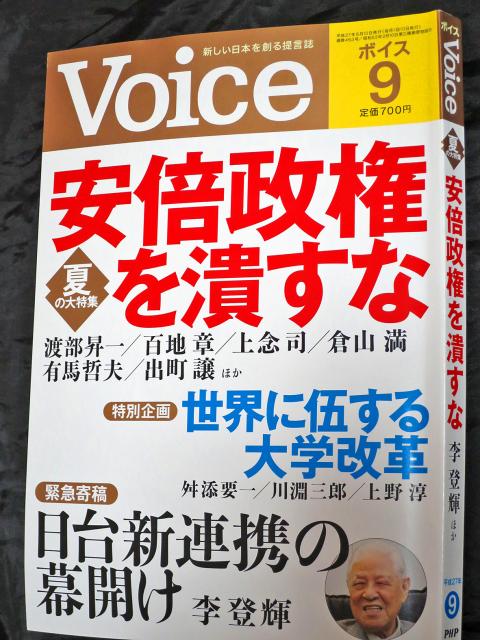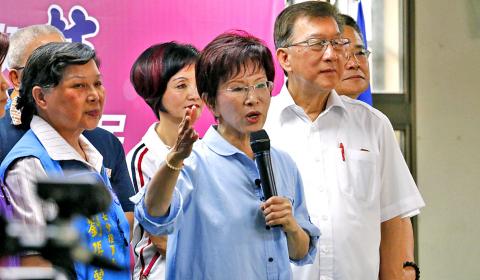The Chinese Nationalist Party (KMT) legislative caucus criticized former president Lee Teng-hui (李登輝) for saying Taiwanese fought for Japan, which was then their motherland, in World War II and told him to return to what he sees as his native homeland.
Lee’s office director Wang Yan-chun (王燕軍) responded that the KMT is using the subject to turn public attention away from its incompetence and lagging public support.
Lee is reported to have said in an interview with a Japanese magazine that insofar as Taiwan had been part of Japan, Taiwanese did not fight in China’s War of Resistance Against Japan as President Ma Ying-jeou (馬英九) recently said at a ceremony to mark the 70th anniversary of the end of the Republic of China’s (ROC) war against Japan.

Photo: CNA
The KMT caucus in a news conference fumed over Lee’s remarks, calling him “a bandit who sold out his nation,” “Hanjian [traitor to the Han people]” and “Japan’s running dog.”
KMT Legislator Lin Yu-fang (林郁方) said Taiwan had been simply a colony, adding: “When did you create the illusion that you could be treated as their equals?”
“Even Japanese would despise Lee’s remarks. Many Japanese academics, and even [Japanese Prime Minister Shinzo Abe] and Japan’s emperor, have regretted and reflected on the policy of colonization. Many Japanese, housewives and young students alike, have taken to the streets to protest Abe’s militarism,” he added.

Photo: CNA
“Lee said Japan was Taiwanese people’s homeland. That is not my homeland. An ancestral land is where your ancestors existed, and Lee’s ancestors were from [China’s] Fujian Province,” Lin said.
He then listed Taiwanese figures who went to China and joined the ROC army during World War II to fight against Japan.
“How could you say that there was no anti-Japan [movements]?” he said.
KMT Legislator Lu Hsueh-chang (呂學樟) said Lee should not assume himself to be representative of all Taiwanese, adding that there were movements in colonial Taiwan resisting Japan.
“Mona Rudo, Luo Fu-hsing (羅福星) and Chiang Wei-shui (蔣渭水) all engaged in anti-Japan activities,” Lu said.
Lu told Lee to return to his motherland and “stop scamming Taiwanese,” saying that Lee’s 12 coronary stents and treatments afforded to him as a former president have all been paid for using public funds.
The KMT caucus said that they would propose scrapping all courtesy afforded to Lee in the next legislative session.
Wang said Lee’s interview with Voice magazine was mainly about possible economic cooperation between the two nations, adding that the Ma administration is trying to “distract people” from an economic slump by making false accusations.
“[Lee] touched upon Taiwan’s history [during the interview] and said 70 years ago there was no ‘war of resistance’ against Japan in Taiwan, only activities resisting Japanese [rule]. We do not know how the magazine edited the interview afterward, and the Chinese translation of it is not of our working either,” Wang said.
“Taiwan was under Japanese rule 70 years ago, during which there were activities resisting Japanese rule, but no ‘war against Japan,’ which is a historical perspective belonging to the KMT as a settler regime, rather than a historical truth,” Lee’s office said, adding that “certain KMT members” are attempting to manipulate ethnicity issues to whip up hostility among groups before next year’s elections.
People First Party presidential candidate James Soong (宋楚瑜) said that as a former president, Lee should have exercised discretion when making such a remark.
“I have not read the entire article, so I am afraid I am not in a position to comment on information disseminated by others. Nevertheless, given that Lee was once a leader of Taiwan, he should have been more discreet with his comments,” Soong said on the sidelines of a news conference held for the release of his latest campaign video in Taipei yesterday morning.
As for Lee’s remarks made last month during his trip to Japan that the disputed Diaoyutai Islands (釣魚台), known as the Senkakus in Japan, belong to Japan rather than Taiwan, Soong said the comments violated basic positions of Taiwan’s head of state.
“The Republic of China’s sovereignty claims over the Diaoyutai Islands are clear and explicit and we must adhere to this position,” Soong said, adding that Lee had said that the disputed islands belonged to the Taiwan Province.
However, KMT Legislator Lee Hung-chun (李鴻鈞), who has openly endorsed Soong, took a harsher tone on the matter.
“We are all citizens of the ROC. I wonder what Lee Teng-hui’s motives were behind his remarks. He needs and should give the public an explanation, particularly given that he has been receiving courtesy payments as a former president,” Lee Hung-chun said.
He added that Lee Teng-hui’s comments were detrimental to the nation’s dignity and were utterly unbearable.
Democratic Progressive Party (DPP) presidential candidate Tsai Ing-wen (蔡英文) — who has been repeatedly asked by the KMT to respond to Lee Teng-hui’s comments — said it is his own “personal experience and feelings” about history.
“[We should] tolerate each other’s historical interpretations. After all, Taiwanese had not been able to govern themselves for the previous few hundred years. We should cherish the freedom of choice we now have under the mechanism of democracy,” Tsai said.

MORE VISITORS: The Tourism Administration said that it is seeing positive prospects in its efforts to expand the tourism market in North America and Europe Taiwan has been ranked as the cheapest place in the world to travel to this year, based on a list recommended by NerdWallet. The San Francisco-based personal finance company said that Taiwan topped the list of 16 nations it chose for budget travelers because US tourists do not need visas and travelers can easily have a good meal for less than US$10. A bus ride in Taipei costs just under US$0.50, while subway rides start at US$0.60, the firm said, adding that public transportation in Taiwan is easy to navigate. The firm also called Taiwan a “food lover’s paradise,” citing inexpensive breakfast stalls

US PUBLICATION: The results indicated a change in attitude after a 2023 survey showed 55 percent supported full-scale war to achieve unification, the report said More than half of Chinese were against the use of force to unify with Taiwan under any circumstances, a survey conducted by the Atlanta, Georgia-based Carter Center and Emory University found. The survey results, which were released on Wednesday in a report titled “Sovereignty, Security, & US-China Relations: Chinese Public Opinion,” showed that 55.1 percent of respondents agreed or somewhat agreed that “the Taiwan problem should not be resolved using force under any circumstances,” while 24.5 percent “strongly” or “somewhat” disagreed with the statement. The results indicated a change in attitude after a survey published in “Assessing Public Support for (Non)Peaceful Unification

PLUGGING HOLES: The amendments would bring the legislation in line with systems found in other countries such as Japan and the US, Legislator Chen Kuan-ting said Democratic Progressive Party (DPP) Legislator Chen Kuan-ting (陳冠廷) has proposed amending national security legislation amid a spate of espionage cases. Potential gaps in security vetting procedures for personnel with access to sensitive information prompted him to propose the amendments, which would introduce changes to Article 14 of the Classified National Security Information Protection Act (國家機密保護法), Chen said yesterday. The proposal, which aims to enhance interagency vetting procedures and reduce the risk of classified information leaks, would establish a comprehensive security clearance system in Taiwan, he said. The amendment would require character and loyalty checks for civil servants and intelligence personnel prior to

The China Coast Guard has seized control of a disputed reef near a major Philippine military outpost in the South China Sea, Beijing’s state media said, adding to longstanding territorial tensions with Manila. Beijing claims sovereignty over almost all of the South China Sea and has waved away competing assertions from other countries as well as an international ruling that its position has no legal basis. China and the Philippines have engaged in months of confrontations in the contested waters, and Manila is taking part in sweeping joint military drills with the US which Beijing has slammed as destabilizing. The Chinese coast guard